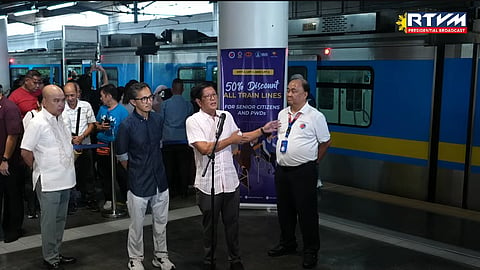
- NEWS
- the EDIT
- COMMENTARY
- BUSINESS
- LIFE
- SHOW
- ACTION
- GLOBAL GOALS
- SNAPS
- DYARYO TIRADA
- MORE

More than a decade later, the Metro Rail Transit Line 3 (MRT-3) can now accommodate more passengers traveling between Quezon City and Pasay City, as the long-delayed Chinese-made Dalian trains finally hit the tracks.
President Ferdinand Marcos Jr. made the announcement on Wednesday during his visit to the MRT-3 Santolan-Annapolis Station.
The Philippine government procured 48 train cars from Chinese firm CCRC Dalian Co. back in 2014, which were delivered in 2016. The trains were initially intended to help decongest the MRT-3 line but were left idle due to "technical compatibility issues" with the local rail system.
“What we did was we went back to these and we made sure that whatever needs to be done to make this Dalian train usable, we did it,” Marcos said. “So this train that we see in front of us, it's fixed, it's ready to use.”
As of writing, three train sets are currently in service, with the remaining cars undergoing rehabilitation after sitting unused for nearly a decade. Each set consists of three carriages, adding nine more cars for commuters.
“It is only today we put in-service these Dalian [trains]. It is the first time commuters will use this since it was bought,” Marcos added.
The rehabilitation incurred zero cost to the government. TÜV Rheinland conducted the technical audit, while Japanese firm Sumitomo Corporation, the MRT-3’s current maintenance provider, performed the final safety checks.
“I am happy. Our government funds were not wasted,” Marcos said.
Once all 48 Dalian cars are fully deployed, they are expected to carry up to 1,200 passengers per train set. Their integration will improve service frequency by reducing train intervals from 4 minutes to 2.5 minutes, easing congestion and enhancing passenger experience. Currently, the MRT-3 accommodates about 380,000 passengers daily.
